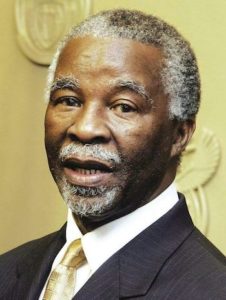
Thabo Mbeki
On this date in 1942, Thabo M. Mbeki was born. He is a Black African politician and activist.
He was born in Idutywa, Transkei, where his parents were teachers and activists. His father, Govan, was a leading figure in African National Congress (ANC) activities in the Eastern Cape of South Africa. A young Mbeki joined the ANC Youth League at 14 and became active in student politics.
When his schooling at Lovedale Academy was interrupted by a strike in 1959, he completed his studies at home. Then he moved to Johannesburg, coming under the guidance of Walter Sisulu and Duma Nokwe. During this time, he was elected secretary of the African Students' Association (ASA). He went on to study economics as a correspondence student at the University of London.
The ASA collapsed following the arrest of many of its members at a time when political movements were coming under increasingly severe attacks from the state. His father was arrested at Rivonia and sentenced to life imprisonment. Mbeki left the country in 1962 at the ANC's orders. From Tanzania, he moved to Britain, where he completed a Master's degree in economics at the University of Sussex in 1966. Remaining active in student politics, he played a prominent role in building the youth and student sections of the ANC in exile.
He worked at the London office with Oliver Tambo and Yusuf Dadoo before being sent to the Soviet Union in 1970 for military training. Later that year, he arrived in Lusaka and became assistant secretary of the Revolutionary Council. In 1973-74, he was in Botswana, discussing the opening of an ANC office there with the Botswanan government. In 1975, he served as an ANC representative in Swaziland. Appointed to the National Executive Committee (NEC) in 1975, he served as ANC representative to Nigeria until 1978. Upon his return to Lusaka, he became the political secretary and then the director of information. From this position, he played a pivotal role in shifting the international media's stance against apartheid. His other role in the 1970s was in building the ANC in Swaziland and underground structures within the country.
During the 1980s, Mbeki rose to head the Department of Information and Publicity, coordinating diplomatic campaigns to involve more white South Africans in anti-apartheid activities. When delegations of sports, business, and cultural representatives visited Lusaka for talks, they all expressed surprise to meet a man deeply engaged in the issues they brought to the table. In 1989, Mbeki headed the ANC Department of International Affairs and was a key figure in the ANC's negotiations with the former government. After the April 1994 general election, Nelson Mandela handpicked Mbeki to be the first deputy president of the new Government of National Unity. After the National Party withdrew from the Government of National Unity in June 1996, Mbeki became the sole deputy president.
People often identify Thabo Mbeki as an independent figure, yet one who remains close to the more visible leadership. His profile as a policy shaper and mediator in the anti-apartheid movement has been built up over a lifetime of involvement. At the African National Congress's 50th National Conference in December 1997, Thabo Mbeki became the current president of the African National Congress.